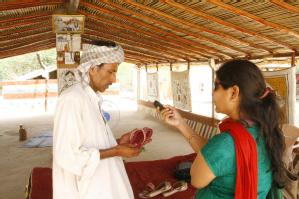Umara Kana Kharet
|
Umara Kana Kharet Age: 45 No education |
|
 |
Interview Summary
Umara Kana is a leather worker. He makes footwear adorned with woollen thread embroidery and mirror work. He has followed this profession for 25 to 30 years. He buys the decorative elements for his leather items from Bhuj. To make a designer pair such as Jalani Juti it takes around three to four days, but for a simpler pair, just one or two days are sufficient. Umara very quickly told us the names of the tools which he uses while working on the leather including rambhi (cutter), aar (needle), chatiani, khaido (for applying gold elements) and karab. Other than footwear, he also makes bags, mirrors, and mobile phone covers. He told us that the profession has been followed for three generations, and now his three sons are also engaged in the craft.
In former times, leather work was exclusively done for the Muslim families. Umara’s family made leather items which families used to decorate the cradles of their infant children, such as the chatardi, a toy tied to the top of the cradle. They often received butter in return for their leather goods as a deangi, a day’s earning. This type of barter exchange is much less common now. The family now make their butter at home and they have seven buffalo. The women of the household wake up early to milk the buffalo, at around four in the morning. They then make chapattis for the family, sweep the floor, fetch the water and do several other household chores before sitting to start their needlework.
Umara is sure that demand for his leather products exists, but they are not able to make enough to cater for the demand. In the former times, he moved village to village as a peddler (pheri) and made leather shoes, mostly for Muslims to wear at ceremonial family occasions. More recently, his business has expanded and he has attended fairs held at Mumbai and Pragati Maidan, Delhi. Tourists, especially foreigners, are important customers. Since they often come to him, he does not have to move around to sell. As a peddler, he could make only small profits and never really earned an amount appropriate to the labour he put in.
His sons have also ventured into ‘reality tourism’, renting bhungas (circular houses with a single room) to tourists for a night or two to experience local life. The bhunga room has only basic facilities such as a bed, a fan, a tube light and chairs. The interior of the bhungas are decorated with exotic mud-work scenes and pictures. For four months during the winter they receive tourists, but at all other times they pursue leather work and embroidery as their main source of income. Previously they had only one bhunga and if they had any visitors the family would sleep outside, vacating the house for their guests. They took out a loan from the Dena Bank in order to build a second bhunga for extra income from rentals.
From sitting in one place on the ground to do their leather work, they often get back pain. At times, with the needle or other tools they injure their hands; to relieve the pain, they used leather soaked in water and apply it to the injury.
Umara adds that his forefathers were from Pakistan and later moved to Marwad. He says that his grandfather’s grandfather was the last to live in Pakistan.
